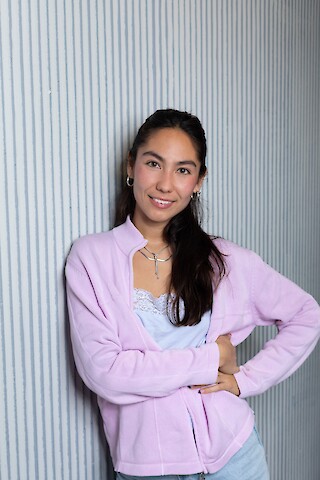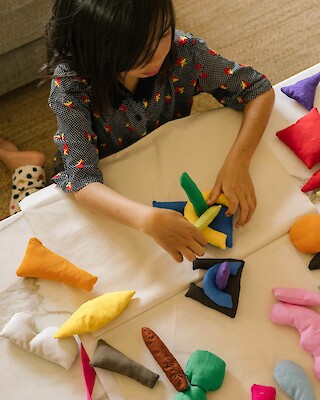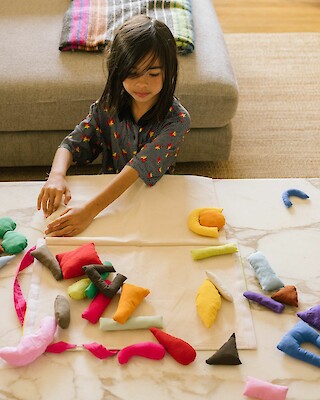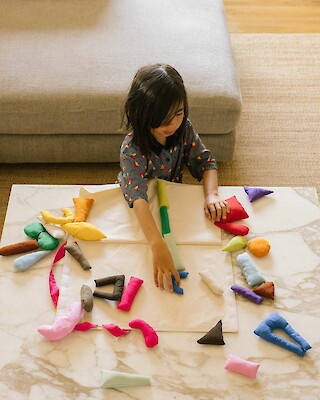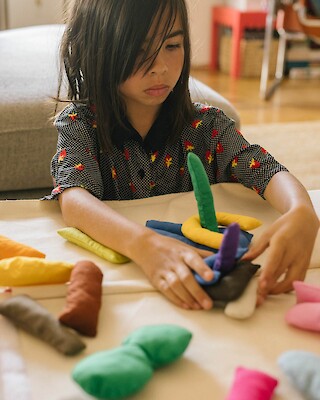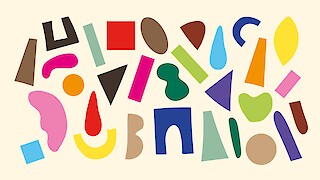
Playbook für einen bewussten Umgang mit sich selbst – und dem Rest der Welt
kianavismara@yahoo.com
[DE]
Das Playbook Kinly ermöglicht Kindern das Erlernen eines behutsamen Umgangs mit sich selbst und dem Rest der Welt. Indem Kinder und ihre Bezugs- und Betreuungspersonen Themen, Aufgaben und Fragen gemeinsam bearbeiten, wird eine spielerische Atmosphäre geschaffen, in der sie ihr Wissen aktiv erweitern und gesellschaftsrelevante Fragen entdecken und besprechen können.
Die ersten zwei Editionen von Kinly beschäftigen sich mit Themen wie Körpernormen, Gender und Diversität. Mit Hilfe des Playbooks und den farbigen Stoffpatches lernen die Kinder, Asymmetrien in unserer Alltagswelt zu entschlüsseln. Sie werden ermutigt, Dinge selbst in die Hand zu nehmen und ihren Kleiderschrank, ihre Bücher und Kinderfilme auf stereotype Vorstellungen zu durchleuchten. In weiteren Editionen werden Themen wie nachhaltiger Konsum und bewusste Ernährung bearbeitet.
Mit Kinly werden Kinder von klein auf dabei unterstützt, normative Erzählungen und Bilder zu hinterfragen, über Identitäten zu reflektieren und wünschenswerte Zukünfte zu entwerfen.
[EN]
The children’s play book Kinly discusses important themes that concern our society like gender, body norms and diversity. Kinly is about having loving relations with one another. The set includes a booklet with information on these topics, as well as tasks and questions for the children to answer and work through with a parent or guidance person. The goal is to create a playful environment in which children can learn and expand their knowledge while keeping the focus on topics that matter.
Teaching children in the early stages of their development on how to interact with others and how to treat others with respect is very important for nurturing a society without discrimination and negativity towards one another. With the help of the playbook and colourful patches children arrive at a better understanding of these topics. When they can visualize what they are being taught and actually go out into the world and take matters into their own hands, learning happens quite quickly. The patches let children use their imagination and really think outside the box to create shapes and environments as they wish.
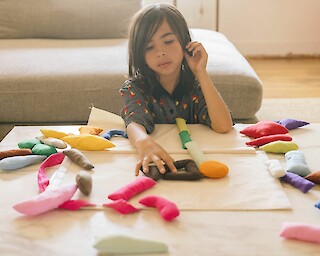
A Conversation with Juniper
I sat down with Juniper, who is 8 years old and we talked about gender, diversity and loving yourself. She knows how to form her own opinions and break down stereotypes and asymmetries in today’s society.
Kiana: Do you think the TV shows or movies that kids watch nowadays are diverse enough?
Juniper: I feel like there are only three skin tones. White, tan and beige. They should have more brownish colours, darker shades. And all the boys have the same voice. And they all have the same body shapes. Like why can’t they be a little different? I think that they should be different, because not everyone is the same. It’s boring. But in the shows I watch they even have blue skin tones.
Kiana: What does love mean to you?
Juniper: If somebody likes you, you could trust them and depend on them and they are nice and you have known them for some time. You know how they are, you trust them. It doesn't matter who they are. It’s not like only an elephant can love an elephant. That would be kind of funny. I mean like: what if an elephant liked a giraffe? I like that.
Kiana: What is your opinion on body shapes?
Juniper: I think it’s not really healthy to be super skinny. Being super skinny, means you don’t eat a lot. But if it’s your natural body shape then it’s fine. But some people just get super skinny just to be pretty.
Kiana: How are the body shapes in kids shows?
Juniper: In the shows I watch, it is more diverse, but like in Disney movies they all look the same. All the Disney princesses act like: „Oh look at me, I’m so pretty!“ And everyone is white, well except the frog princess. She is really pretty. She has a darker skin tone, but she is also super skinny. It’s not realistic.
Kiana: Do you think that any anyone can work in any profession they want? Because often times, people think being a pilot is something only a man can do. Or being a ballerina is only something for girls.
Juniper: Yeah, I think anyone can work any job they want. Male, female, or just non-binary people, anyone. Why not?
Kiana: Do you think pink is more for girls and blue is more for boys? These are the stereotype colours our society often attributes to these genders. What is your opinion on colours?
Juniper: I think that everybody can wear every colour, because colours are just colours. Colours are natural and all colours are good.
Kiana: What is your favourite colour?
Juniper: I don’t know, it changes on my mood.
Kiana: Can anyone paint their nails or wear skirts and dresses?
Juniper: Yeah anyone can.
Kiana: Why do you think there is this misconception, that only girls should wear skirts or paint their nails?
Juniper: Because people think that girls can only do this or they only wear this, but I think that is regular for all genders to do both.
When discussing these questions with her, I was surprised to find that she has progressed quite fast in this topic. After talks with different parents, I have come to find that children form their opinions through the people who raise them. A child doesn’t see inequality in anyone or anything. The reasons for poor development in this field is due to the opinions and education of external sources.
